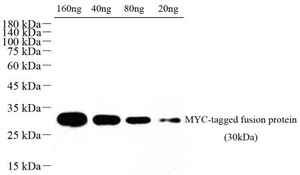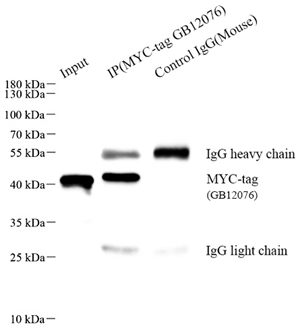Anti-MYC Tag Mouse mAb (100 μl)
| Reactivity: | |
| Applications: | WB & IP |
| Host Species: | Mouse |
| Clonality: | Monoclonal |
| Gene Name: | MYC Tag |
Synonyms: | c-myc, Myc, MYC, Myc Epitope Tag, Myc tag, MYC tag, EQKLISEEDL, Tag |
Immunogen: | KLH conjugated Synthetic peptide corresponding to EQKLISEEDL |
Isotype: | IgG1,κ |
Purity: | Affinity purification |
Product Usage Information
WB | Tag (All species) | 1: 500-1: 1000 | MYC-Tag fusion protein |
IP | Tag (All species) | 1: 50-1: 200 | transfected HEK-293F cells |
Special note
Epitope labeling has been proved to be an effective method that can be performed on target proteins. Tag antibody can be used in a variety of applications, including ChIP, CoIP, ELISA, FC, IF, IHC, IP, WB and so on.
Background
The myc-tag is a short synthetic polypeptide sequence derived from c-myc protein that can be added to recombinant proteins to enable isolation and study when an antibody is not available. This antibody recognizes the MYC tag EQKLISEEDL. Using recombinant DNA technology, the myc tag can be fused to the protein and then an antibody against the myc tag can be used to probe, including purification using chromatography, tracking the protein in localization studies using immunofluorescence, or quantifying levels using Western Blot. The short polypeptide sequence can be fused to the N-terminus or the C-terminus of any protein without influencing function, although it is advised to avoid fusing it to a secretory signal.
Images
| Western blot analysis of MYC-Tag (GB12076) at dilution of 1: 1000 |
| Immunoprecipitation of transfected HEK-293F cells lysate using MYC-Tag (IP: GB12076, 1: 100; Detection: GB12076, 1: 3000) |
Storage
| Storage | Store at -20°C for one year. Avoid repeated freeze/ thaw cycles. |
| Storage Buffer | PBS with 0.02% sodium azide, 100 μg/ml BSA and 50% glycerol. |


